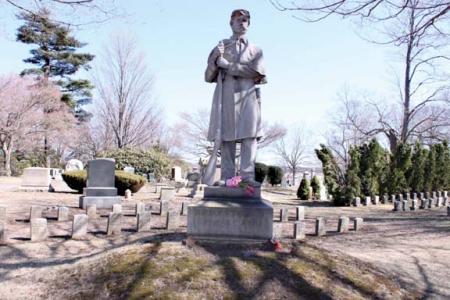April 7, 2011
 A memorial statue in Cedar Grove Cemetery recalls the leadership and sacrifice of Captain Benjamin Stone, one of more than 1,300 Dorchester men who fought for the Union cause in the Civil War. Stone was killed in action during the Second Battle of Bull Run in 1862. Photo by Leslie Fowle
A memorial statue in Cedar Grove Cemetery recalls the leadership and sacrifice of Captain Benjamin Stone, one of more than 1,300 Dorchester men who fought for the Union cause in the Civil War. Stone was killed in action during the Second Battle of Bull Run in 1862. Photo by Leslie Fowle
Dennis Brinkworth and Leslie Fowle are undergraduate students in the Northeastern University School of Journalism.
It was 150 years ago this month – more precisely, it was at 4:30 a.m. on April 12, 1861 – that the Confederacy’s Gen. Pierre G. T. Beauregard commenced the Civil War by ordering his artillery to open fire on Fort Sumter in the harbor of Charleston, a key city in the rabidly secessionist state of South Carolina.
The war had been long in the making, as had the military plans for the South and the North and in the surge of patriotism following the assault on the fort, soldiers and would-be soldiers on both sides rushed to bear arms.
The town of Dorchester in Massachusetts, the state where the abolition cause had found fertile soil, was among the quickest to react to the threat against the federal union of states forged by the founding fathers.
Kevin Tucker of Wakefield, Mass., department commander of the Massachusetts Sons of Union Veterans of the Civil War, and descendant of Dorchester’s Charles Elwell, a private in Lincoln’s Union Army, said the men of Dorchester were both willing and excited to join the war against the Southern rebellion.
“When the war first broke out, they had more volunteers than openings,” he said.
The call to arms hit all walks of life in Dorchester.
Henry Nicholas Dwight, a Dorchester resident and Harvard-trained lawyer, was a well-known abolitionist, Tucker said. “He joined the Dorchester regiment as a private and got promoted quite rapidly throughout the war.”
The recruiting center for enthusiastic Dorchester townsmen was Lyceum Hall on Meetinghouse Hill, which has since been torn down. The first recruitment session, on April 22, 1861, led to Dorchester residents raising $7,000 and creating two Union companies of 100 volunteers. From the beginning of the war to the Union victory in 1865, 1,342 Dorchester men were recruited to serve and the town itself raised $158,339 for the Northern cause.
Dorchester’s Company K, a key part of the 11th Massachusetts Regiment, was led by Benjamin Stone Jr., a leader of the local marching drill outfit. “When Lincoln called the troops, Stone had all of the men in his drill outfit volunteer,” said Tucker.
The Dorchester men moved to Fort Warren in Boston Harbor and began preparing for battle, which wasn’t long in coming. On July 21, they got their first taste of war in the largest and bloodiest battle in U.S. history at that point – the First Battle of Bull Run (or Manassas) where the Union Army was defeated at a cost of 460 men.
So it didn’t take long for the grim reality of war began to sink in for the people of Dorchester.
“The mood changed,” Tucker said. “The war was expected to last a few months, but as it went on, and word of the gruesome battles came back home, volunteer numbers began to dwindle.”
The Second Battle of Bull Run saw the loss of the Company K’s celebrated leader when Stone, by then a captain, was killed in a volley of Confederate fire. But his troops were not deterred, and the 11th Regiment’s Col. William Blaisdell, also of Dorchester, took command.
Blaisdell was an example of how diverse the regiment was, said Tucker.
“Blaisdell worked for the state as a constable before the war, and was a battle-hardened veteran who had fought under Ulysses Grant during the Mexican-American War.”
The Dorchester men kept on fighting, engaging in the brutal battles of Fredericksburg and Gettysburg, among others. After three years of carrying the Union flag, the men were relieved of duty and came back to Massachusetts as heroes.
Dorchester paid a high price when it sent its men to war to save the union – 97 men out of its 2,000 residents – a rate of loss nearly triple that of the Union Army – 360,222 men from a population of 22 million.
In 1867, the Pickwick Club, a literary society originally made up of 12 Dorchester men, erected the Soldiers Monument on Meetinghouse Hill to memorialize those who died in action in the Civil War. The names of the 97 soldiers are on the monument. At the dedication of the monument, Pickwick Club member Francis P. Denny offered these words:
“It was here you came to urge your young men to enlist in the army of the Union, at those earnest meetings where the word of patriotism was answered by the pledge of life for the country, and whose enlistment papers contained many a name inscribed upon the roll of honor here.”


